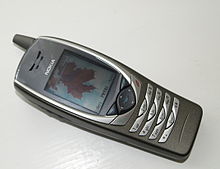 | |
| Manufacturer | Nokia |
|---|---|
| Type | Camera phone |
| First released | September 2002 |
| Availability by region | 2003 |
| Predecessor | Nokia 6340 (6650) Nokia 6340i (6651) |
| Successor | Nokia N91 (6650) Nokia N91 8GB (6651) |
| Related | Nokia 7600 |
| Compatible networks | GSM 900 and 1800 MHz W-CDMA 2100 MHz |
| Form factor | Bar |
| Dimensions | 132 mm (5.2 in) H 52 mm (2.0 in) W 25 mm (0.98 in) D |
| Weight | 141 g (5.0 oz) |
| Operating system | Nokia Series 40 |
| Memory | 7 MB internal |
| Removable storage | None |
| Battery | Removable 950 mAh Li-Ion |
| Rear camera | VGA camera |
| Display | TFT LCD (4096 colors, 128 x 160 pixels) |
| Sound | Loudspeaker, vibration motor |
| Connectivity | Bluetooth 1.1, Infrared |
| Data inputs | Push buttons |
| SAR | 0.64 W/kg |
Nokia 6650 is a mobile phone developed by Nokia. It was the company's first 3G phone, first leaked in June 2002[1][2] and eventually unveiled on 26 September 2002.[3] It was also the first device supporting the 3G W-CDMA 2100 MHz band.[4]
A 1900 MHz version known as the 6651 was released for the North American market soon after. Alongside the jointly-launched Motorola A845, the pair were the first UMTS 3G phones launched in America, on the short-lived AT&T Wireless UMTS network (the network later shut down, as part of the merger with Cingular Wireless - which eventually debuted its own 3G UMTS network). As a result, the Nokia 6651 was one of only two phones that ever launched on the AT&T Wireless 3G network.[5]
Its appearance is very similar to that of Nokia 6100, but with a larger screen and external antenna (it was the last Nokia candybar phone with an external one). The 6650 uses the Nokia Series 40 platform, and is equipped with a VGA camera and supports Java ME applications. The device has 4096 colours and features Bluetooth, Infrared and a WAP browser.[3][6]
The Nokia 6650 was used by UK mobile network operators to test their networks during the 3G roll-out. Despite this, the Nokia 6650 was never released to the general public in the UK.[7]
- ^ "Nokia's first 3G phone sets sail". CNET. 13 July 2003. Retrieved 2020-12-02.
- ^ "Nokia's first 3G phone". Gizmodo. 13 June 2003. Retrieved 2020-12-02.
- ^ a b Wearden, Graeme (26 September 2002). "Nokia takes wraps off first 3G phone". ZDNet. Retrieved 2020-12-02.
- ^ "World's First GSM / 3G Dual Band Mobile". 3G. Archived from the original on 11 January 2007. Retrieved 1 December 2020.
- ^ "AT&T Rolls Out 3G Wireless in Four Cities". 20 July 2004.
- ^ "Nokia 6650". GSMArena. Retrieved 1 December 2020.
- ^ Linge & Sutton (October 15, 2015). 30 Years of Mobile Phones in the UK. ISBN 978-1445651088.